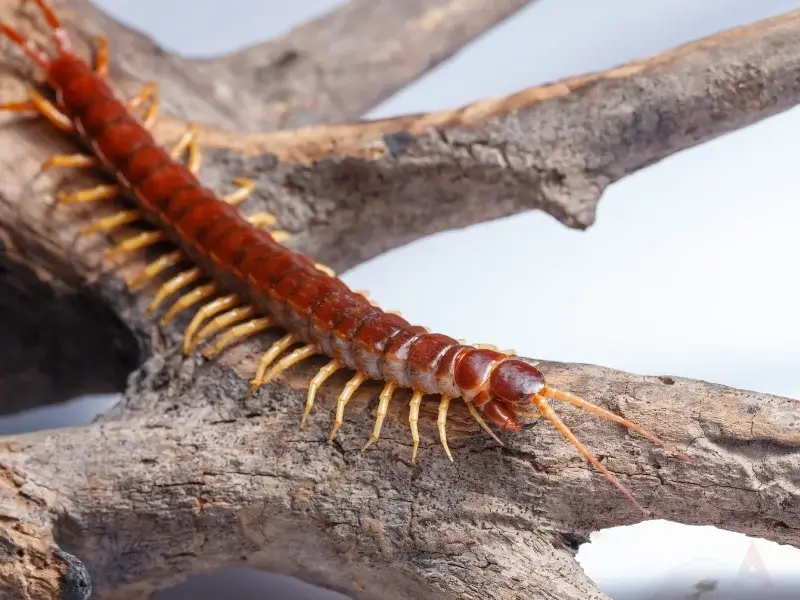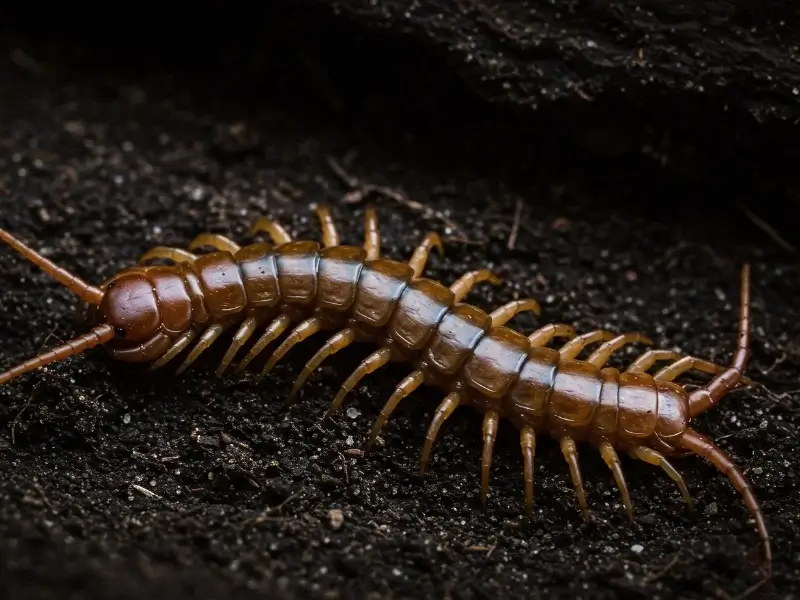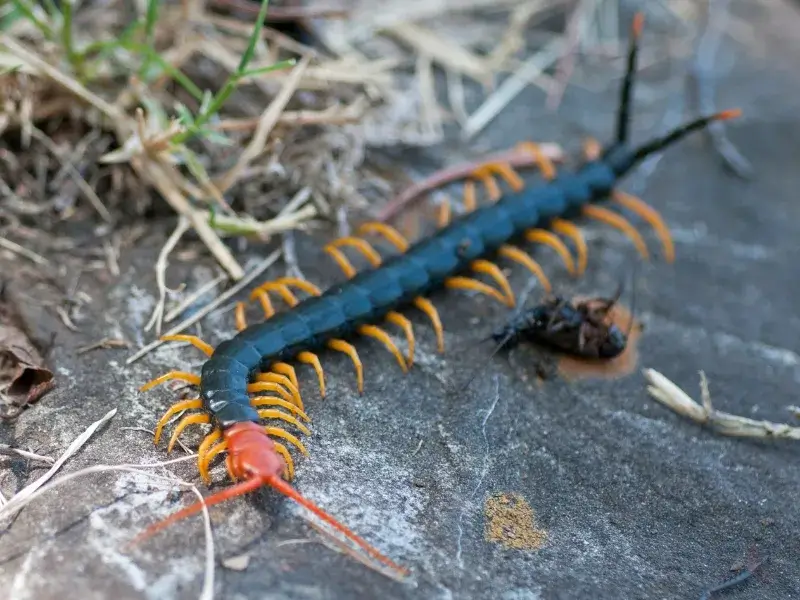
Are Centipedes Poisonous?
Are centipedes poisonous? It’s one of the first questions you might ask when you spot one scurrying across the floor. While most centipedes are harmless, some species possess venom strong enough to cause pain or allergic reactions in humans. Understanding which centipedes are venomous—and how to avoid bites—can help keep your home safe and pest-free.
Table of Contents
Are Centipedes Poisonous or Venomous?

Technically, centipedes are venomous, not poisonous. They use venom to hunt prey, not poison for defense. However, many people use the phrase “are centipedes poisonous” interchangeably. Centipedes have specialized front legs called forcipules that inject venom into their prey—typically insects, spiders, and other small arthropods.
The strength of centipede venom varies between species. While smaller centipedes may only cause mild irritation if they bite, larger species like the giant desert centipede or Texas redheaded centipede can deliver more painful bites with swelling and redness that may last several hours.
Which Centipedes Are Poisonous to Humans?
Most centipede species found in North Carolina, including the house centipede, pose little to no risk to humans. However, larger species found in warmer climates contain more potent venom. So are centipedes poisonous? Some are. These include:
1. House Centipedes
House centipedes are the most commonly found centipede species inside homes. Are house centipedes dangerous? Despite their unsettling appearance—with long legs and fast movements—they are actually beneficial, feeding on cockroaches, silverfish, and other pests. House centipedes are not considered dangerous to humans, and their bites rarely break the skin.
2. Giant Desert Centipede (Scolopendra heros)
This species is native to the southern United States and can grow up to 8 inches long. A bite from a giant desert centipede can cause intense pain, swelling, and localized redness. Symptoms typically subside within a few hours to a day but can be more severe in small children or people with allergies.
3. Amazonian Giant Centipede
Known as one of the largest centipedes in the world, the Amazonian giant centipede is capable of subduing large prey such as small reptiles and mammals. While they are not found in North Carolina, they are an example of how potent centipede venom can be in certain species.
4. Texas Redheaded Centipede
The Texas redheaded centipede is one of the largest and most striking centipede species found in the southern United States, including Texas, Oklahoma, Arkansas, and occasionally into nearby regions. Its bright red head, dark body, and yellow legs make it easy to recognize—and a bit intimidating to encounter.
This species can grow between 6 and 8 inches long and is known for its defensive behavior. The Texas redheaded centipede uses its front legs, or forcipules, to inject venom when it feels threatened. While its bite is rarely life-threatening, it can cause intense pain, swelling, and localized redness that may last for several hours. Some individuals may experience mild systemic symptoms such as headache, chills, or nausea, particularly if allergic to insect venom.
What Happens If You Get Bitten by a Centipede?
Centipede bites are rare but can be painful. When a centipede injects venom, it can cause pain, redness, and mild swelling similar to bee stings. Larger species may cause more pronounced symptoms, especially in sensitive individuals. Here’s what to expect:
Common Centipede Bite Symptoms
- Rarely, severe allergic reaction or anaphylaxis
- Immediate pain or burning sensation at the bite site
- Swelling and redness that lasts several hours
- Itching or hives on or near the affected area
- Localized allergic reactions in sensitive individuals

Are House Centipedes Poisonous?
Many people wonder, “Are house centipedes poisonous?” The short answer is no. House centipedes do contain venom to subdue their prey, but it’s not strong enough to harm humans. Their bites are extremely rare and usually no more serious than a minor insect bite.
When to Seek Medical Attention
Most centipede bites can be treated at home, but you should seek medical attention immediately if you experience:

- Severe pain lasting more than 24 hours
- Worsening swelling or redness
- Difficulty breathing or dizziness
- Signs of infection such as pus or fever
Individuals with known allergies or compromised immune systems should seek prompt medical care after any centipede sting or bite.
How to Treat a Centipede Bite
If you’re bitten, stay calm—most centipede bites are not serious. Here’s what to do:
1. Clean the area with soap and water to remove bacteria.
2. Apply a cold compress or ice pack to reduce pain and swelling.
3. Take over-the-counter pain relievers or antihistamines if needed.
4. Avoid scratching the area to prevent secondary infection.
5. If symptoms worsen, seek medical help immediately.
While centipede bites can be painful, they are rarely life-threatening. The discomfort typically resolves within a few hours.
Why Centipedes Enter Homes
Centipedes often enter homes seeking moisture, warmth, and prey. They are commonly found in basements, bathrooms, and other damp areas. Eliminating excess moisture and sealing entry points can greatly reduce centipede activity indoors.
- Use dehumidifiers in basements or crawl spaces
- Seal cracks and gaps around doors and windows
- Eliminate clutter and organic debris
- Fix leaky pipes and improve ventilation
Preventing a Centipede Infestation
To keep centipedes out of your home:
- Reduce moisture in damp areas like bathrooms and crawl spaces
- Keep your home clean and free of insect prey
- Store firewood and mulch away from your foundation
- Regularly inspect basements and attics for pests
Consistent home maintenance and a proactive approach to pest prevention are key to avoiding unwanted centipede visitors.
FAQ: Centipedes in North Carolina
Are centipedes poisonous to pets?
Most centipedes are not dangerous to cats or dogs. However, if a curious pet tries to bite or play with a centipede, the centipede may bite in self-defense. This can cause mild pain or swelling similar to a bee sting. If your pet experiences persistent swelling, drooling, or signs of pain, contact your veterinarian to rule out an allergic reaction.
Is it safe to sleep with a centipede in your room?
It’s unlikely that a centipede will crawl onto your bed or bite you while you sleep. Centipedes prefer dark, damp spaces near floors or walls and generally avoid humans. However, seeing one in your bedroom can indicate a moisture or pest issue attracting them. Sealing cracks, reducing humidity, and calling a pest control expert can help keep them out.
Are centipedes dangerous to humans?
In most cases, centipedes are not dangerous. Smaller species, such as house centipedes, rarely bite and pose no health threat. Larger centipedes can deliver painful bites, but these are typically no worse than mild bee stings and fade within a few hours. Severe allergic reactions are extremely rare but possible, so always monitor symptoms and seek medical attention if they worsen.
Do centipedes bite or sting?
Centipedes don’t sting in the traditional sense. Instead, they use their front legs—called forcipules—to inject venom into their prey. In humans, this can feel like a quick, sharp bite that causes localized pain or redness. The term “centipede sting” is often used interchangeably with “centipede bite,” but both describe the same action.
Professional Centipede Control in North Carolina
If you’re seeing centipedes inside your home and wondering, “Are centipedes poisonous?”—the experts at A-1 Pest Control can help. We service Lenoir, Mooresville, Hickory, Blowing Rock, West Jefferson, and Hendersonville and surrounding areas. Our trained technicians identify the species, locate potential nesting sites, and provide effective treatments that protect your family and home year-round.
Contact A-1 Pest Control today at 828-481-9140 or fill out the form below to schedule your FREE inspection and learn how our proven home pest control plans can keep centipedes and other household pests away for good.
Schedule Your Free Inspection
Complete the form to schedule your no obligation estimate with A-1 Pest Control.
"*" indicates required fields
